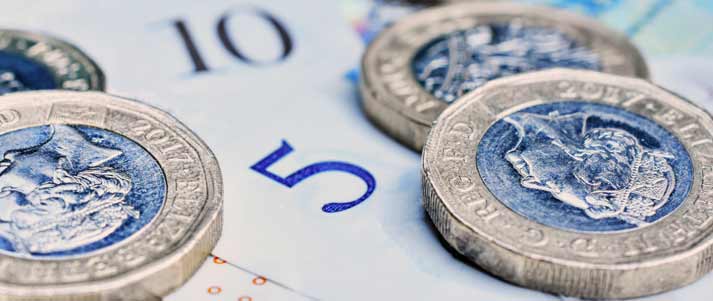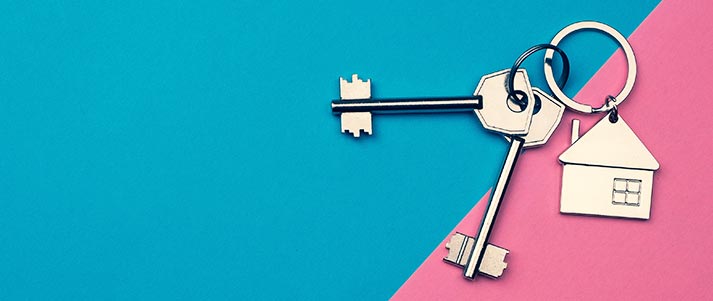Getting a mortgage to buy a house can feel like a complicated process. But we're here to show you how they work and how to get one.

Credit: ViDI Studio, Pixel-Shot, Blan-k – Shutterstock
Getting on the property ladder is a dream for many of us, and doing so will almost always require you to get a mortgage. Since buying a house can be costly, mortgages are there to help you spread the cost over a longer period – breaking it down into more manageable monthly payments.
But with all the jargon, mortgages can be a little confusing, if not intimidating. So before you start house hunting, make sure you're up to speed with the basics.
Below, we'll show you what a mortgage is, how to get one and more.
What’s in this guide?
What is a mortgage?
As houses and apartments usually cost hundreds of thousands of pounds, it's unlikely you'll be able to pay for them upfront. That's where mortgages come in.
A mortgage is a special kind of loan specifically designed to help you buy a house. Usually, you pay a small part of the value of the property upfront (the deposit), and you take out a mortgage on the remainder.
You then pay back the lender every month for a set period of time (usually 20–30 years, but it can be shorter), with added interest.
The property also serves as collateral – if you stop repaying, the lender can repossess the property. This way, there's not a lot of risk to the lender, but there is some risk for the homeowner.
Because mortgages often cover a large amount of money, there are some requirements as to who can get one and how much they can borrow.
Lenders will look at your income, credit score and financial commitments before they let you take out a mortgage. This also ensures that you should be able to keep up with repayments comfortably.
Advantages of a mortgage
Here are the main advantages of getting a mortgage:
- Homeownership – Getting a mortgage makes it much easier to become a homeowner, as you'll be able to spread the cost of a property over a number of years.
- Paying off a mortgage instead of paying rent – When you're paying off a mortgage, the property will eventually be yours. Every month, you'll be paying towards owning a home, rather than paying a landlord.
- Better interest rate than personal loans – Even though you'll be borrowing a lot of money when getting a mortgage, the interest rates are generally much better than other loans (especially personal loans).
Disadvantages of a mortgage
Here are the main disadvantages of getting a mortgage:
- The value of your property could drop – You'll never know what will happen in the future. If the value of the property drops, you could end up with negative equity. This is where the remaining mortgage value is more than the value of the house.
- Interest rates may change – When interest rates increase, your monthly mortgage payments could go up. In 2022 and 2023, we've seen interest rates skyrocket, leaving some people unable to keep up with their mortgage repayments as they suddenly had to pay hundreds of pounds a month more.
Types of mortgages

Credit: nednapa – Shutterstock
There are many different types of mortgages. While they all work in a similar way, there are some differences when it comes to interest, repayment methods, fees and more.
Here are some of the most common types of mortgages:
- Fixed-rate mortgage – The interest rate is fixed for a certain period of time. This means that you know exactly how much you'll be paying every month for the fixed-rate period.
- Variable-rate mortgage – The interest rate of this type of mortgage changes depending on the terms of the mortgage. It's usually tied to inflation and the Bank of England's base rate – this means that your payments could go up or down every month.
- Buy-to-let mortgage – As the name suggests, this mortgage is for people who want to buy a property to rent out. Lenders also take the potential rental income into consideration, as well as the borrower's income.
- Interest-only mortgage – With this mortgage, you only pay the interest on the amount you've borrowed. Monthly payments will usually be much lower, but you'll still owe the full amount at the end of the term.
- Guarantor mortgage – If you're not able to get a mortgage on your own, you can get a guarantor to take on some of the responsibilities. They agree to cover any missed payments (if they occur) to give the bank a bit more security.
- 95% mortgage – You'll only need a 5% deposit to get a 95% mortgage. However, since you're borrowing a larger percentage, you are likely to pay higher interest rates on these types of mortgages.
How to get a mortgage
Here are the steps you need to follow to get a mortgage:
-
Save for a deposit
Before you can buy a house, you'll need to save for a deposit. As we explained earlier, your deposit normally needs to be at least 5% of the property value. But the bigger your deposit, the better deal you can get on your future mortgage.
A 20% deposit will generally get you a mortgage with lower interest rates compared to only having a 10% deposit. Mortgage offers tend to improve every time you hit an extra 5% of the property value for your deposit (5%, 10%, 15%, etc.). Any percentages in between usually give you the same deals.
Saving for a deposit can be tricky, especially since it's such a large chunk of money. Luckily, there are some ways to speed up the process.
For example, you can open a Lifetime ISA (LISA). This is a kind of savings account that's designed to help you save for your first house or retirement.
You can add up to £4,000 into a LISA account per year and the government will gift you a 25% bonus on top. That's up to £1,000 of free money every year!
If you're buying a house with someone else, you can use both LISAs as part of the deposit. There are some restrictions to this account, though. We explain everything in our guide on how Lifetime ISAs work.
How much deposit do you need for a mortgage?
The average deposit people put down to buy a house in the UK is around 15% of the property value. However, it's possible to get a mortgage without putting down that much money.
Most mortgages will require you to put at least 5% of the property value down as a deposit. There are even 100% mortgages, where you can borrow the full price of the house – but these are pretty rare and often won't get you the best rates.
This is also where Loan-to-Value (LTV) ratio comes into play. The LTV ratio is the amount of money you need to borrow in relation to the value of the property.
The higher your deposit, the lower your LTV ratio. And the lower your LTV ratio, the lower the bank's risk to lend you the money. This usually means you can get a better deal on your mortgage and it'll be easier to get approved.
For example, if the property is valued at £250,000 and you put a £25,000 deposit down (10%), you'll still need to borrow 90% of the property value. The LTV ratio in this scenario is 90%.
Also keep in mind that you'll need to set aside money for other costs like a mortgage broker, solicitor, furniture and any emergencies.
-
Work out how much you can borrow

Credit: Ubermensch Matt – Shutterstock
After you've started saving for a deposit, it's important to figure out how much money you could borrow. As a rule of thumb, you can generally borrow 4.5 times your annual salary (before tax).
For example, if you earn £25,000 per year, you might be able to borrow around £112,500. Again, if you're buying a house with someone, you can combine your income to get a joint mortgage.
You can use a mortgage calculator online to get a better idea of how much you could borrow on your salary.
However, remember that this is the maximum amount you can borrow. Since it's in line with your income, you might find it's a better idea to borrow less than the maximum amount. This way, it'll be easier to keep up with repayments (especially if interest rates go up!).
-
Find out how to qualify for a mortgage
For a bank to approve your mortgage, they'll look at your income, debts, savings, spending habits and deposit. Make sure to get your finances in order before applying – this sets you up with the best chance of getting accepted.
Affordability plays a big role here. While the bank keeps your income in mind, they also look at your financial commitments. If you have a monthly car payment, credit card payments or a personal loan, they also take this into account.
Generally, the more financial commitments you already have, the less likely you can comfortably pay for bigger mortgage payments every month.
Here are some things you can do to improve your chances of getting a mortgage:
- Improve your credit score – A good credit score shows the bank that you've got a track record of keeping on top of your finances. Read our guide on how to improve your credit score for more info.
- Be realistic about how much you can afford – While applying for the maximum you can get on your salary may sound tempting, it will be harder to get approved. If your monthly mortgage payments are already a stretch, any changes in interest rates could make it impossible to keep up with repayments. If you borrow less, the bank will be more confident you can keep paying your mortgage.
- Save a bigger deposit – As mentioned previously, a bigger deposit means less risk for the bank. This will in turn make it easier to get approved for a mortgage, as the bank will have less to lose.
- Cut your spending and financial commitments – Before applying for a mortgage, try to pay off any debts or personal loans you may have taken out in the past. With fewer financial commitments, you might find you have higher chances of getting approved for a mortgage.
-
Find a mortgage broker

Credit: Master1305 – Shutterstock
A mortgage broker (or mortgage advisor) is somebody who specialises in mortgages. They help you find the right mortgage with the best deals and can give you advice on your application.
While you don't necessarily need a mortgage broker, it does make the process easier.
Also, some lenders only work through mortgage brokers, so you could lose out on great deals without one.
When searching for a mortgage broker, it helps to look for whole-market brokers. This means that they aren't tied to a single or a small number of lenders. Whole-market brokers look at all the possibilities, making sure you get the best deal on the market.
Some brokers also charge a fee, which could be hourly, a fixed rate or a percentage of the property value. However, you can also find brokers that are fee-free, which often means they'll take a commission from the lenders.
L&C is a good site to start your search, as they only have whole-market fee-free brokers.
-
Get an Agreement in Principle
The next step in getting a mortgage is to get an Agreement in Principle (AIP). This is an estimate from the lender showing you how much you can borrow.
A mortgage broker can help you get an AIP, but it's also possible to apply for one yourself.
Getting an AIP doesn't impact your credit score, and you're not obliged to use that specific lender in the future either.
However, this isn't an official mortgage offer. You'll still have to make the proper application, and the AIP doesn't guarantee you to be accepted. If any of your circumstances have changed, you may not get approved.
An AIP does give you a good idea about how much you can borrow. Some estate agents even ask to see it before they show you a house, just to make sure you're serious about buying. They're usually valid for 90 days.
-
Find a house you want to buy
Now you know how much you can borrow, you can start looking for houses within that price range. Sites such as Rightmove and Zoopla are great places to start, as you can set filters for a preferred price and area.
You can also speak with a local estate agent, as they'll hear about properties before they're posted online.
-
Make an offer and apply for a mortgage

Credit: Borsuk Renat – Shutterstock
Once you find a house that fits your criteria and falls within your budget, it's time to make an offer through the estate agent. You might even be able to negotiate the price if the seller is interested.
When you agree on a price, you can put in the formal mortgage application. If you use a mortgage broker, they can help you with your application.
To apply for a mortgage, you usually need the following documents:
- ID (passport or driving license)
- Proof of income
- Proof of deposit
- Three to six months' worth of bank statements.
-
Receive a mortgage offer
If the lender accepts your application, you will receive a mortgage offer. The offer is usually valid for three to six months.
You can accept the offer if you're happy with the rates, or apply with a different lender to find a better deal. Before deciding to apply for a different mortgage, it's important to remember that mortgage rates can change very quickly (as we've seen in 2022 and 2023).
Once accepted, it's time for your solicitor to exchange contracts and agree on a day of completion.
Average mortgage rates
According to Statista, these are the average mortgage rates in the UK for a two-year fixed mortgage in the last few years:
- March 2020 – 1.4%
- March 2021 – 1.56%
- March 2022 – 2.14%
- March 2023 – 4.47%
A BBC article from July 2023 showed that average rates for five-year fixed-rate mortgages rose above 6%. While a couple of percentage points may not seem like a lot, on a mortgage of a few hundred thousand pounds, it can end up costing hundreds of pounds more each month in interest.
-
Check how the mortgage repayments work
Once everything has been completed and the property is officially yours, the mortgage repayments will start. When the monthly repayments come out of your bank account is something you will have agreed upon when applying for your mortgage.
The amount you repay also depends on what type of mortgage you have and how much you borrowed. Your mortgage payments will consist of both interest and paying off your loan (unless you have an interest-only mortgage). That means that every month, you're making progress towards owning the full property.
Bought a house and getting ready to move? Use our moving house checklist to be fully prepared.
source https://www.savethestudent.org/money/how-to-get-a-mortgage.html
